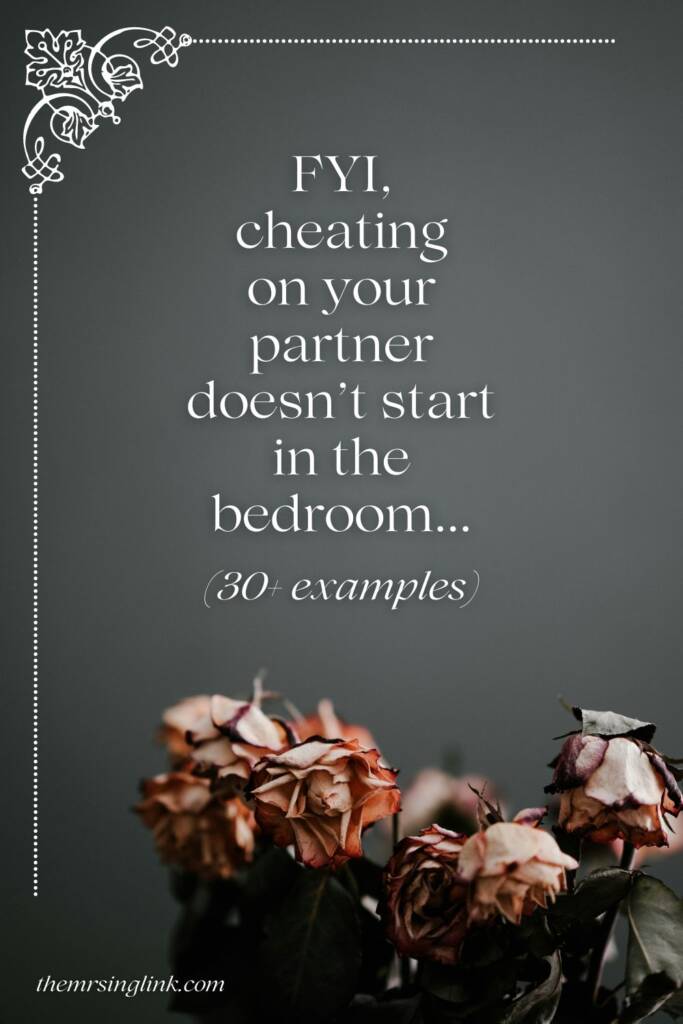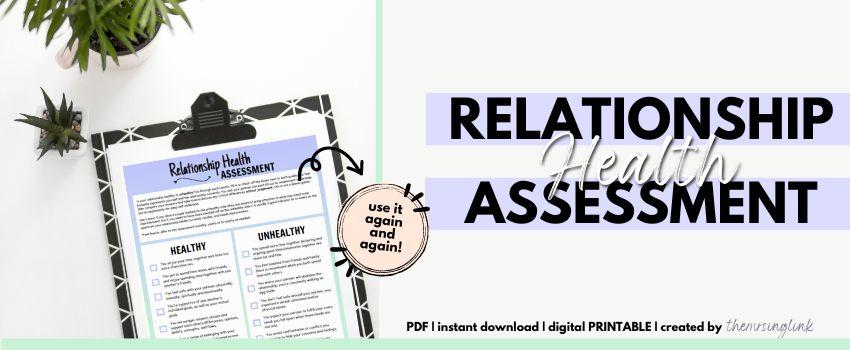We’re not going to like it but we’re going there. It pains me to even have to say in this day and age…but cheating on your partner doesn’t start in the bedroom! It starts with you.
I think we all know this – we’re aware of it – yet we’re hell-bent on supporting our imperfectness as human beings…until we directly suffer the consequences. Notice how people who cheat tend to find some way to deflect responsibility, justify their action, excuse their reasoning or ultimately blame their partner? Many simply believe they have done no wrong.
For too many, cheating sits on this fuzzy, blurry line – a line than can easily be erased or moved. There are those who have decided that certain behaviors – leading up to sex or not – are, in fact, totally innocent in nature and irrelevant to unfaithfulness.
You know, I said this to my husband recently, and it’s stuck with me. Brace yourself, because this will rub many the wrong way, but I said, “We have really lost that sense of *fear* in marriage (or relationships).” WAIT, because this is not the fear for your life, horror movie level of terror you think. Go look up the word fear in the Thesaurus – you’ll find the many synonyms for the word.
I believe there’s a healthy level of fear in not wanting to dishonor or disrespect your partner. For instance, I fear [tremble, dread, worry, feel anxious at] the thought of doing something to hurt my husband. THAT fear. It’s like we’ve completely elevated ourselves above that fear that says, “I would never, I could never, I’m not capable, I’m better than that.“
What we will unpack in this post..
As if we don’t need to question our motives, thinking or behavior. Because it’s deemed totally innocent to go as far as entertaining someone that’s not your partner, giving them the time, effort and mental space, to then willingly meet in that hotel room – with all thoughts and anticipation for what “could” or is ultimately “supposed to” happen next – even if physical intimacy never actually occurs.
The fact someone can take every opportunity leading up to it somehow makes them 100% faithful to their partner?
Emotional infidelity exists for a reason. Yet there are those who do deny emotional infidelity as unfaithfulness (cheating). Moreover that the act of cheating is purely physical or sexual. I just think anything else isn’t seen as *sexy* to mainstream society – rather, it would literally expose everyone of unfaithfulness in some way. That’s simply too uncomfortable. For a culture that glorifies sex – sorry, but it’s true – it’s just not *sexy* to say that lustful thoughts of someone that isn’t your partner are stepping stones to cheating.
So, if you believe there is fidelity and infidelity, then you’re agreeing to more than a simple absolute. If you believe in faithfulness, then you believe that there is more than one way of being faithful to your partner, but also that there are countless ways to be considered unfaithful. Period.
We need to be more willing to grasp and understand that cheating on your partner doesn’t start in the bedroom. Man has drawn a hard, definitive line at sex. But I’m sorry, nobody on God’s green earth is going to convince me that hard line literally manifests the moment P goes in the V, and call that sensible, logical, or acceptable.
Therefore, I definitively believe infidelity is more like a gradient – a spectrum, if you will. Because cheating doesn’t just appear [happen] from thin air – it’s carefully calculated – doesn’t that mean circumstances leading up take place prior to a hard line drawn in the first place?
We’re human, yes, yet I don’t think that gives us approval to caress our obviously flawed, corrupt “nature”. With that, I’d argue that every single one of us is actually guilty, in some way, of not being 100% faithful to our partner.
That isn’t meant to make us sit and sulk in condemnation, to portray ourselves the villain, but we ought to feel more conviction. We should be able to really take a step back and understand that our hearts – at their very core – aren’t as “good” or faithful as we think they are or want to believe. We really delve in the whole skating on thin ice or moving the bar to suit our conscience, or flawed human-ness. Or, we deceive ourselves by thinking we could never be capable of such a thing – cheating. See that? It’s singular, but after you read this post – and I hope you do in full – you should rephrase that to say “things”.
Then ask yourself, “Am I capable of such things?“
Cheating on your partner starts with you, not in the bedroom (30+ examples)

Cheating on your partner starts with your intent (or ulterior motive inside your head)
Cheating on your partner starts when you seek out attention from outside your relationship, like on social media or from someone else for their time, fondness, admiration, affirmation, validation or consideration.
It starts when you willingly put yourself in a position of or openly engage in “temptation” (I.e., dressing a certain way so as to be hit on at the bar, attending the bachelor party at the strip club, meeting up with your EX to “catch up” over dinner, or engaging in flirtatious banter to see if you still got “game”).
It’s when you keep going to the gym these days and those hours in order to see or talk to that person (to relish in an *unspoken* chemistry or covert arousal).
It starts when you go out of your way and look for any excuse to talk to that person (like that particular co-worker or “friend”).
When you find yourself disappointed to not get one-on-one time with that person, or even jealous when their desired one-on-one isn’t with you (i.e., you catch that particular co-worker talking to or spending time with someone else, and it bothers you).
You’re vague or evasive with your partner about a particular person or your “relationship” with them (i.e., you leave out important or sensitive information about your connection or fondness with that person).
[Related Read: Having a “work spouse” is simply an excuse to cheat]
You have *the butterflies* with that person though are in denial of it (i.e., you anticipate talking to, seeing and being around this person beyond the “platonic” level). *Define platonic: when does your anticipation/excitement to see/speak to them consistently or inappropriately exceed that of your partner?
When you’re suddenly, unnecessarily and inappropriately texting or calling that person more incessantly, secretly, or at all hours.
You get annoyed of your time with that person being interrupted (i.e., your partner’s presence while in the middle of a phone call or text conversation with that person bothers you or makes you more inclined to be secretive and defiant).
You sense that something you’re doing or that you did would ultimately upset or disappoint your partner if they knew, but whatever it is is a desire you want to keep on fulfilling so you go the length of denouncing your behavior as wrong and keeping it from them.

Cheating on your partner starts with your choices (informed decisions)
Cheating on your partner starts when you go to lunch with that co-worker each day and avoiding telling your partner about it (keeping it a secret, or lying), or you go in spite of your partner feeling uncomfortable with it.
You begin unnecessarily and inappropriately *following*/*connecting with* people on social media, “sliding into” their DMs and/or responding to them.
When you factor that person into your finances or contribute to theirs [without your partner’s knowledge, consideration or approval] (i.e., you’re paying for that co-workers lunch several days a week or buying them the new phone they couldn’t afford).
You exclude your partner from work-related events, your circle of “friends” or from that particular “friend”.
When you are guarded over your phone or experience discomfort when your partner is within view of the screen [because of…that person or whatever inappropriate behavior you’re engaging in] (i.e., the off chance your partner sees “that text” from “that person” makes you more protective of your partner gaining access to your device because, if caught, you know they have valid reasons not to trust you).
You refuse to make the distinction of what it means to Like (or interact with) another woman’s *selfie* on social media.
You become meticulous with erasing *traces* of your previous steps from your partner (i.e., you don’t want your partner to find out you were with that person, so you take x, y, z measures).
It starts the moment you share more intimate details of your life with that person over your partner (i.e., things you haven’t even told your partner you’ve openly shared with that person).
When you feel the need or impulse to hide or delete your texts from your partner.
You change certain names in your contacts to conceal that person’s identity.
You share and confide in that person of your relationship problems, not for genuine advice but knowing they will tell you exactly what you want to hear (i.e., you’re choosing the validation of that person to come between you and your relationship).
You start deleting your browsing history, changing passwords, making more stuff inaccessible, privatizing content on your socials as a means to conceal certain activities or individuals from your partner.
You start hyper-focusing on your appearance or change in appearance for someone else (i.e., you decide you want to look a certain way in order to impress or gain that person’s attention, or because they feed you with regular compliments).

Cheating on your partner starts with your unconstrained thoughts (not taking your thoughts captive)
Cheating on your partner begins the moment you notice someone is attractive, to then sexualize them and even romanticize over them. *As a woman, I can pass by a drop-dead gorgeous woman…without sexualizing her (or my overcome by her attractiveness not being sexual in nature) – there’s a difference.
When someone “catches your eye” and you take a second, third or more glance(s) because your creeping thoughts keep telling you to mentally capture and visualize their assets.
You’re actively thinking of that person more often than is appropriate, to the point you often miss them and develop a sense of longing [to hear from them, talk to them or see them] (i.e., you continue carrying this along while comforted by the fact your partner cannot know all that’s really going on in your mind).
When an attractive person appears on the TV and you imagine yourself being intimate with them (*it’s important to keep in mind how willing and often you’re engaging in this day dreaming-like behavior).
It starts when you allow negative, intrusive thoughts to alter and affect how you view and treat your partner (i.e., you have consistent thoughts about how easy it would be to walk away, the fantasy of hooking up the new co-worker, that your “friend” does certain things *better* or can fill in gaps your partner can’t).
You start comparing that person’s looks to your partner’s or even actively seeking out others who are more attractive (i.e., more specifically thinking how you wish your partner looked better or looked like them).
It starts the moment you separate the idea of one “soulmate” from “choosing a partner” (i.e., stumbling upon other attractive people or engaging in connections aside from your partner makes you second guess your “choice” and instead lean on the unlikely probability of *one* prospective partner in life).
Cheating on your partner starts with what you receive or allow “in”
Cheating on your partner starts with day-dreaming over someone else (you envision “what it might be like” with them and how different your life would be).
When you succumb to or engage in [i.e., addiction] p*rnographic material because you get a rise from it (i.e., it makes you feel some sort of way that isn’t honorable)…and feel zero conviction about it (i.e., yes, even the raunchy R and X-rated movies, books and shows).
It begins with your inability or refusal to address and shut down advances or inappropriate flirting/interactions with someone else (i.e., that one co-worker is “touchy-feely” or comes across exceedingly flirtatious toward you, yet you receive the ego boost willingly, make the excuse that it’s their personality, or simply avoid possible confrontation altogether by downplaying the behavior – thus enabling the cycle).
It starts the moment you allow someone else to meddle inappropriately with your relationship and between you and your partner (i.e., you refuse to shut down that person who openly criticizes your partner or your relationship).
When suddenly your relationship problems are no longer “a bother” because of someone else (i.e., the connection with that “friend” is compensating for the fighting in your relationship which, in turn, makes you care less about what’s going on in your relationship).
It starts the moment your desire [sexual or not] for that person decreases your desire for your partner (i.e., you’re motivated to fulfill that desire outside the confines of your relationship).
[pt_view id=”cb66511r8f”]
Cheating on your partner starts with your response
Cheating on your partner starts when you go out of your way (there’s ulterior motive here) to tell another person they’re attractive or that you’re attracted to them. *This isn’t necessarily the same as telling someone they look nice or complimenting their change in hairstyle – again, it’s motive in question.
It starts the moment you’re willing to lie or conceal the truth from your partner for someone else.
You tell your partner what you’re doing is not wrong even though you know it is, and you’d be bothered by it if the tables were turned.
You immediately and constantly shut down your partner’s feeling of worry, distrust or discomfort about that person while refusing to hear, let alone consider their perspective. *If you’re doing this, then your partner automatically does have something legitimately to worry about.
When you fully believe and convince yourself that nothing you’re doing is considered “unfaithful” and that you’re incapable of such a thing (i.e., the lie we tell ourselves is that everything we do is perfect, that we’re always a good, honest person who is incapable of hurting our partner).
You talk to that person in such a way where you wouldn’t if it were in front of your partner.
It starts when you assume or don’t [have to] worry because your partner will ultimately forgive you – or always does.
Your emotional response is unwarranted when your partner asks harmless or appropriate questions about that person/”friend” (i.e., you feel guilty or uncomfortable when approached by your partner about that person and then you get defensive or shut down).
It starts when your initial response to “getting caught” is to either 1. get “big” mad towards your partner, 2. lie to defend your innocence 3. blame your partner in order to victimize yourself, or 4. prepare/threaten to end the relationship.
When you live by the “not within my control” or “not my fault” mentality rather than taking responsibility and setting boundaries with others outside your relationship (i.e., you think someone coming onto you at work is out of your control and there’s nothing you can do about it).
Cheating on your partner starts with what you prioritize
Cheating on your partner starts when you respond back to that person’s calls and texts promptly, firstly, and thoughtfully over your partner’s.
It begins when someone else’s respect, feelings, views, well-being, and reputation take precedence over your partner’s (i.e., you show respect to, listen to and consider that person’s feelings over your partner’s).
When you put more effort into how you look for that person [or others] than for your partner (i.e., you dress exceptionally well when you’re going to see “that person”).
It starts with making excuses for why more of your time and effort [planned or by default] goes toward that person.
You choose defending the “friendship” with that person over your partner’s expressed discomfort (i.e., your partner has pointed out certain behaviors [between you and that person] that make them uncomfortable yet maintaining that friendship “level” is more important than securing your partner’s trust).
When it feels right or justifiable to disrespect your partner for the sake of that person (i.e., that “friend” wants to grab drinks last minute after work, so you exercise your “free will” and “entitled” time by not informing your partner – *disappointing/disrespecting your partner has no weight or effect on you).

Cheating on your partner starts with your values
Cheating on your partner starts when you side with “being nice” or non-confrontational with someone else over defending your loyalty to your partner.
When you create double standards pertaining to inappropriate interactions with someone else (i.e., it’s *okay* for you to openly and casually flirt with someone else, but if your partner did the exact same thing it’s not *okay*..[..”because it’s somehow different”]).
You gravitate more to and willingly engage in the “single-life” aspects or single friendships (i.e., you proactively aim to preserve a lifestyle that promotes singlehood, or even polyamory).
It starts with excusing certain behaviors for the simple fact your partner cheated first (i.e., revenging for wrongs done to you).
When you believe that cheating is strictly black and white, or gray areas do not apply to you (as either a man or woman), wherefore in your mind many wrongs are right (i.e., flirting as cheating, for instance, is substantially reduced for women because it can be viewed as personality traits [friendliness, endearment] whereas for men flirting is more frowned upon because of sexual connotations).
You peddle on the ideology that “men/women have needs“, or that humans are not wired for monogamy (that we’re like animals) and therefore ride the back of vindication (i.e., you tell your partner that you are not responsible for if things go *too far* with someone else because “you’re biologically wired that way”).
When you believe, because you expressed your dissatisfaction in the relationship to your partner, that you now have self-approval to seek fulfillment outside the relationship if your partner does not cooperate in repairing the relationship, or meeting your needs.
You’ve conditioned yourself to believe you’re totally innocent until PROVEN [caught] guilty (i.e., you base trust and loyalty off of “what my partner doesn’t know won’t hurt them [the relationship]”).


